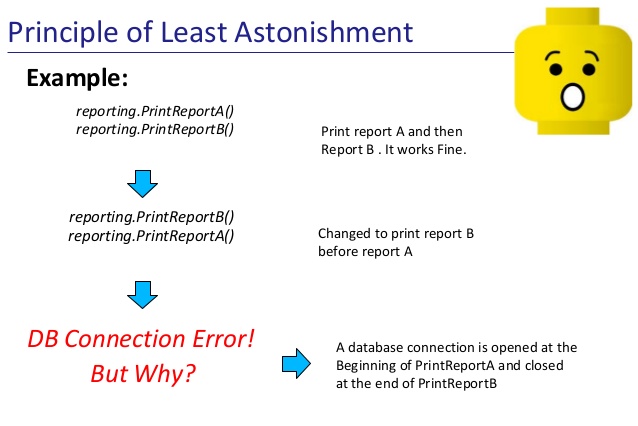Tree Coding vs. Bush Coding
How does circular reference look like? It is a point where you wait for your doctor; they wait for a state to accept the vaccine, and the state waits on people like you to come to the doctor. Who has the responsibility? Who can change the state?
In the past, we used singletons and static calls to get anything anywhere instantly. But soon, we got into the circular references trap. Now we moved to dependency injection and this problem does not exist anymore... or does it?
With dependency injection, dependencies grow naturally into the form of a tree:
final class VaccineRepository
{
public function __construct(
private Connection $connection
) {
}
public function get(int $id): Vaccine
{
return $this->connection->getFromTable('vaccine', $id);
}
}
Then we use the repository inside a controller:
final class DoctorController
{
public function __construct(
private VaccineRepository $vaccineRepository
) {
}
public function helpPerson(Person $person, int $vaccineId)
{
$vaccine = $this->vaccineRepository->get($vaccineId);
$vaccine->injectInto($person);
// ...
}
}
The dependency tree is clear and obvious:
Controlleruses ↓Repositoryuses ↓Connectionuses ↓- PostgreSQL database uses ↓
- PostgreSQL Docker image
- PostgreSQL database uses ↓
Why Tree?
The significant advantage of trees is that they grow strong and tall. They're robust and can produce a lot of branches and leaves to rise to the sun. The sun gives them more energy to grow even further. A typical example of tree coding is dependency injection.

Tree Coding vs Bush Coding
Why Bush?
At first sight, a bush grows much faster than a tree. Its goal is to grow as many leaves as possible in a short time. It does not care about the future as much as a tree. A typical example of bush coding is static method calls and static classes.
Power of Tree Coding
Tree coding is similar to climbing a huge mountain. Let's focus on the basic idea:
What is The Goal of Tree Coding?
- It has a clear hierarchy from the bottom up, as you have guessed from dependency injection over static calls
- Single place for single responsibility
- Need a new leaf? Put it on a branch with access to the Sun
- Need a new branch? Put it next to another branch, where is enough space
- Need a new tree trunk? Plant a new tree
- It's intuitive - everybody knows putting a branch inside a leaf is a bad idea
- It respects principle of least astonishment

But bushes tend to spread faster, so it's only natural to assume they're already in your code. Slowly growing and waiting for their time to slow you down.

I have come around some bushes in my code before:
Today we look on 3 more examples that can be easily missed while slowly polluting your code:
1. Service Inside Value Object
By value object, we talk about any entity, value object, or data transfer object. Anything that can be created multiple times, like vaccines.
final class Vaccine
{
public function __construct(
private string $uuid,
private float $volume
) {
}
public function getShotVolume(int $shotRank): float
{
// ...
}
}
How do we create a vaccine? Let's build a factory:
$vaccineFactory = new VaccineFactory();
$vaccine = $vaccineFactory->create();
Pretty straight-forward, right?
Later that year, there is a big pressure on pharmaceutical companies, so programmers are under huge pressure to deliver. The vaccine object is now a bit more powerful:
$vaccine->orderNewOne();
$vaccine->vaccinateHuman($human);
$vaccine->vaccinateAnimal($animal);
Our simple vaccine with a basic method is now powerful service locator that can vaccinate itself and order itself. It's like giving birth to yourself.
❌
What happened? In a factory, someone had an idea to put the services right into vaccine itself:
final class Vaccine
{
public function __construct(
private string $uuid,
private float $volume,
+ private VaccinatingService $vaccinatingService,
+ private OrderingService $orderingService,
) {
}
}
That's not a way to go.
How to Refactor?
It can happen to anyone. I'm aware of 3 such places in Rector itself that we plan to refactor. What can we do about it?
Let's refactor service from the object...
final class Vaccine
{
public function __construct(
private string $uuid,
private float $volume,
- private VaccinatingService $vaccinatingService,
- private OrderingService $orderingService,
) {
}
}
...to service using the object:
+$orderingService = new OrderingService();
+$vaccinatingService = new VaccinatingService();
-$vaccine->orderNewOne();
+$orderingService->order($vaccine, 100);
-$vaccine->vaccinateHuman($human);
+$vaccinatingService->vaccinate($human);
-$vaccine->vaccinateAnimal($animal);
+$vaccinatingService->vaccinate($animal);
✅
2. Trait adding Dependency
Let's stay with a vaccine from previous example. We got into the same problem:
$vaccine->orderNewOne();
$vaccine->vaccinateHuman($human);
$vaccine->vaccinateAnimal($animal);
But the constructor seems correct:
final class Vaccine
{
public function __construct(
private string $uuid,
private float $volume
) {
}
}
What is going on?
final class Vaccine
{
use SomeHelperTrait;
}
Hm... what is that?
trait SomeHelperTrait
{
/**
* In Symfony
* @required
*/
public OrderingService $orderingService;
/**
* In Nette
* @inject
*/
public VaccinatingsService $vaccinatingsService;
}
Oh, so it's using frameworks (Nette/Symfony) dependency injection to add dependencies... how smart bush coding!
❌
To be honest, I put similar crap code into Rector. Shame on me. It took bunch of pull request to get rid of completely.
How to Refactor?
The same way as the example above. Get rid of traits...
final class Vaccine
{
- use SomeHelperTrait;
}
...and use services to handle the service work:
$orderingService = new OrderingService();
$vaccinatingService = new VaccinatingService();
$orderingService->order($vaccine, 100);
$vaccinatingService->vaccinate($human);
$vaccinatingService->vaccinate($animal);
✅
After this incident, we forbid trait completely with PHPStan.
3. Using Nette Template to Transfer Data
Last but not least, there are template objects. It about any object that magically sets its variables on the fly:
$someObject = new stdClass;
$someObject->name = 'Maybe' + 'Some';
$someObject->age = '100';
It's common to use these on unknown JSON response, but here these variable names ("name", "age") and their values are known.
I don't think Symfony or Laravel have those, but it's a typical code from Nette controller:
use Nette\Application\UI\Presenter;
final class DoctorPresenter extends Presenter
{
public function renderInstructions()
{
$this->template->welcomeHere = '...';
$this->template->waitingRoom = '...';
}
}
The $template is a base template object that holds assigned variables magically. Instead of a service locator, we have a variable locator (not good).
This simple construction of 2 variables is ok, but it will grow to a dirty bug.
To give you a comparison, this is how Symfony handles the problem:
use Symfony\Bundle\FrameworkBundle\Controller\AbstractController;
final class DoctorController extends AbstractController
{
public function renderInstructions()
{
$this->render(__DIR__ . '/template/doctor/instructions.twig', [
'welcomeHere' => '...',
'waitingRoom' => '...',
]);
}
}
We pass parameters into template exactly once, at the time where it's needed. Not sooner, not later, just in time, also called JIT.
Not twice by accident:
$this->template->welcomeHere = '...';
// 100 lines bellow or in another method called
$this->template->welcomeHere = 'no';
// which is used?
...and not maybe:
if ($this->isOpened) {
$this->template->welcomeHere = '...';
}
Still, so far, that is framework convention it works well when used correctly.
But what is not forbidden is allowed. We can use the object for reading the data:
use Nette\Application\UI\Presenter;
final class DoctorPresenter extends Presenter
{
public function renderInstructions()
{
$this->template->welcomeHere = '...';
if ($this->template->welcomeHere === '...') {
$this->template->welcomeHere .= PHP_EOL. 'Thank you!';
}
}
}
This is very bad idea:
- we depend on
$this->template->welcomeHereto be set somewhere above - how do you even check if magic property is set?
if (isset($this->template->welcomeHere) && $this->template->welcomeHere !== null) {
$this->template->welcomeHere .= PHP_EOL . 'Thank you!';
}
- we knew we assigned type of
string, but magic made the type disappear - we have no idea what the type is, static analysis and Rector does not work
- we're promoting to use a magical object for anything in
render()methods - we're saying it's ok to set a single variable twice in one method
❌
How to Refactor?
How can we get out of this bush? It's simpler than the two examples before. What would you do?
Use a variable, of course.
-$this->template->welcomeHere = '...';
+$welcomeHere = '...';
-if ($this->template->welcomeHere === '...') {
+if ($welcomeHere === '...') {
- $this->template->welcomeHere .= PHP_EOL. 'Thank you!';
+ $welcomeHere .= PHP_EOL. 'Thank you!';
-}
+$this->template->welcomeHere = $welcomeHere;
This way we:
- use a variable for a variable content (a content that might change and we expect it to change)
- we separate a templating system from the construction of parameters
- we have a type of
string, so does PHPStan and Rector - and if we know the template parameters types... we can... wait, that's a topic for another post
✅
We made a rule for PHPStan to keep an eye on us.
And that's it! Now we've refactored from 3 ground floor bushes to high trees!
What was the hardest to spot bush coding you've met? How did you refactor it? Share in comments ↓
Happy coding!